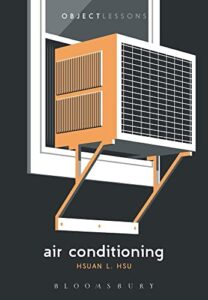By Hsuan Hsu. Bloomsbury, 2024.
As a technology of environmental comfort, air conditioning aspires to pass unnoticed. Yet, by manipulating the air around us, it quietly conditions the baseline conditions of our physical, mental, and emotional experience. In homes, offices, libraries, museums, archives, and shopping malls, climate control systems shore up the fantasy of a comfortable, self-contained body. At the same time that air conditioning makes temperature a non-issue in (some) people’s daily lives, thermoception—or the sensory perception of temperature—is being carefully studied and exploited as a tool of marketing, social control, and labor management. Yet access to AC is deeply uneven: its reliance on carbon fuels divides the world into comfortable, climate-controlled bubbles and increasingly uninhabitable environments where AC is unavailable.
Air Conditioning considers questions about culture, ethics, ecology, and social justice raised by the history and uneven distribution of air conditioning technologies. Drawing on interdisciplinary scholarship on temperature and AC, it fleshes out the thermal logics at work across a range of advertisements, novels, films, buildings, and conceptual artworks. Individual chapters focus on the history of thermal comfort, AC’s impacts on architecture, the ecological implications of indoor and outdoor “weather making,” and critical perspectives on AC from the urban heat island and the Global South.
Hsuan L. Hsu is Professor of English at the University of California, Davis, and the author of The Smell of Risk: Environmental Disparities and Olfactory Aesthetics (2020). His research focuses on American literature, cultural geography, ethnic studies, and sensory studies. He is currently working on a book about olfactory worldmaking.
PRASE FOR AIR CONDITIONING
A cool blast of discomforting brilliance, Air Conditioning examines the conditioning of our indoor and interior climates of work, domesticity, and consumption. It is not inward looking to the sealed boxes and bubbles of air-conditioned detachment, but focused on the complex exchanges and inequalities involved in sustaining comfortable places, cooled bodies and technologies by making other places, and other (often poor and racialised) lives, uncomfortable and unliveable. Hsu’s book hums, ventilating ideas in an insistent, vital tone to show how this ordinary object, submerged within walls and behind vents, has mattered so much to us.”
—Peter Adey, Royal Holloway University of London, and author of Air (2014)
Hsuan L. Hsu demonstrates how air conditioning has radically transformed how we think, feel, and relate to others. After reading this book, you’ll never be as comfortable in an air-conditioned room again – and that’s exactly the point.”
—Bharat Venkat, Associate Professor of Society & Genetics, History, and Anthropology, Director of the UCLA Heat Lab, and author of At the Limits of Cure (2021)
